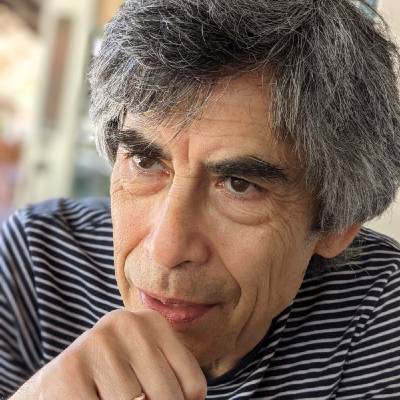
A millisecond too close in,
a century too far out,
water the plague of uncertainty
and no dry land to assuage the doubt.
A dizzying look at the world
through the eyes of a disowned daughter;
ocean declared the province of death
and everywhere water, water.
Any direction the wind goes
provides for them who have no route
circling wave-ripples, wave-ripples,
wave-ripples, in aimless pursuit.
The sun stuns, the heat strokes,
and no one else can see
but they who die in mid-ocean
how imperishable water can be.
Вода
Недолет на миллисекунду,
перелет на тысячу лет,
вода — чума переменчивости,
и без суши опоры нет.
Мир глазами брошенной дочери:
головокружение, тошнота,
океан объявлен волостью смерти,
и повсюду — вода, вода.
Куда бы ветер ни дунул,
если сбился с пути человек, —
лишь круги на воде, круги на воде,
бесконечный, бесцельный бег.
Солнце давит, жара дурманит,
и не знает никто, никогда,
кроме гибнущих в океане,
как нетленна бывает вода.
Russian translation by Dmitry Manin

Wayne Pernu is an American poet who grew up in Minnesota and now lives in Portland, Oregon.

Dmitri Manin is a physicist, programmer, and translator of poetry. His translations from English and French into Russian have appeared in several book collections. His latest work is a complete translation of Ted Hughes’ “Crow” (Jaromír Hladík Press, 2020) and Allen Ginsberg’s “The Howl, Kaddish and Other Poems” (Podpisnie Izdaniya, 2021). Dmitri’s Russian-to-English translations have been published in journals (Cardinal Points, Delos, The Café Review, Metamorphoses, etc) and in Maria Stepanova’s “The Voice Over” (CUP, 2021). In 2017, his translation of Stepanova’s poem won the Compass Award competition. “Columns,” his new book of translations of Nikolai Zabolotsky’s poems, was published by Arc Publications in 2023 (https://eastwestliteraryforum.com/books/nikolai-zabolotsky-columns-poems).
Launched in 2012, “Four Centuries” is an international electronic magazine of Russian poetry in translation.
“The Lingering Twilight” (“Сумерки”) is Marina Eskin’s fifth book of poems. In Russian.
A collection of moving, often funny vignettes about a childhood spent in the Soviet Union.
“Vivid picture of life behind the Iron Curtain.” —Booklist
“This unique book will serve to promote discussions of freedom.” —School Library Journal
A new collection of poems by Ian Probstein. (In Russian)
Young readers will love this delightful work of children’s verse by poet William Conelly, accompanied by Nadia Kossman’s imaginative, evocative illustrations.
A book of poems by Maria Galina, put together and completed exactly one day before the start of the Russian invasion of Ukraine. This is Galina’s seventh book of poems. With translations by Anna Halberstadt and Ainsley Morse.